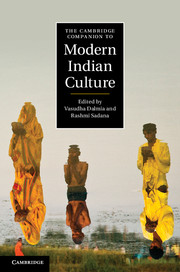Book contents
- Frontmatter
- Introduction
- Part I Cultural contexts
- Part II Cultural forms
- 6 The Bengali novel
- 7 Writing in English
- 8 Dalit life stories
- 9 National tradition and modernist art
- 10 Mass reproduction and the art of the bazaar
- 11 Urban theatre and the turn towards ‘folk’
- 12 Aesthetics and politics in popular cinema
- 13 Musical genres and national identity
- 14 Voyeurism and the family on television
- Further reading
- Index
- Cambridge Companions to Culture
12 - Aesthetics and politics in popular cinema
from Part II - Cultural forms
Published online by Cambridge University Press: 28 May 2012
- Frontmatter
- Introduction
- Part I Cultural contexts
- Part II Cultural forms
- 6 The Bengali novel
- 7 Writing in English
- 8 Dalit life stories
- 9 National tradition and modernist art
- 10 Mass reproduction and the art of the bazaar
- 11 Urban theatre and the turn towards ‘folk’
- 12 Aesthetics and politics in popular cinema
- 13 Musical genres and national identity
- 14 Voyeurism and the family on television
- Further reading
- Index
- Cambridge Companions to Culture
Summary
Recent discussions of cinema and national identity in the ‘third world’ context have tended, by and large, to cluster around the concept of a ‘third cinema’. Here the focus is on recovering or reinventing local aesthetic and narrative traditions against the homogenizing impulses of Hollywood in its domination over markets and normative standards. One of the hallmarks of third-cinema theory has been its firmly unchauvinist approach to the ‘national’. In its references to wider international aesthetic practices third cinema asserts but also problematizes the boundaries between nation and other. In the process, it also explores the ways in which the suppressed internal others of the nation, whether of class, sub- or counter-nationality, ethnic group or gender, can find a voice.
A substantial lacuna in this project has been any sustained understanding of the domestic commercial cinema in the ‘third world’. This is important because in countries such as India the commercial film has, since the dawn of the ‘talkies’, successfully marginalized Hollywood's weight in the domestic market. This is not to claim that it has functioned within an entirely self-referential autarchy. The Indian popular cinema stylistically integrated aspects of the world ‘standard’, and has also been influential in certain foreign markets. But it constitutes something like a ‘nation-space’ against the dominant norms of Hollywood, and so ironically fulfils aspects of the role which the avant-garde third cinema proclaims as its own.
- Type
- Chapter
- Information
- The Cambridge Companion to Modern Indian Culture , pp. 226 - 246Publisher: Cambridge University PressPrint publication year: 2012
- 1
- Cited by



